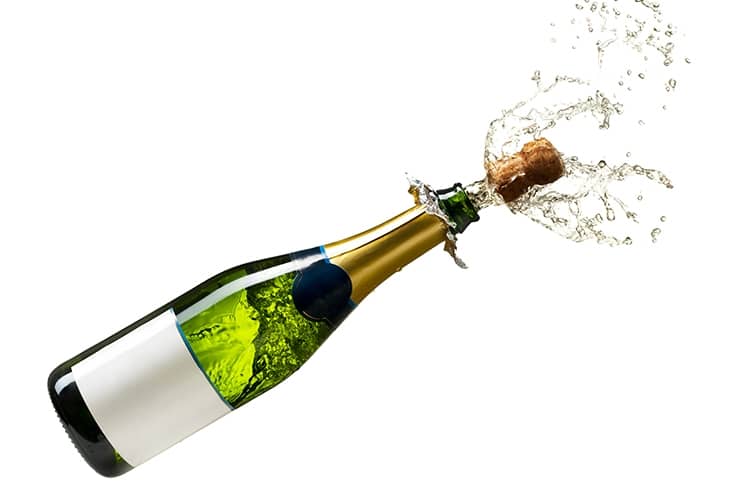In idle chatter the other evening, somebody pooh-poohed champagne. He was a brave soul because in certain circles — and this was among them — one is presumed to think the presence of champagne a mark of opulence, extravagance, a special occasion, a treat. In even more exalted circles, of course, a display is made of not thinking it a treat but a staple, and babbling in a familiar manner about ‘Bolly’ as though one had proceeded straight from the breast to the bubbly without passing through lemonade on the way.
‘To be honest,’ said my friend, ‘if Fate were to touch my shoulder and whisper that I would never drink champagne again, would I be bothered? It’s perfectly -pleasant of course, but not something I’d miss much.’ To everyone’s surprise almost everyone, emboldened, agreed with him. A discussion followed in which we volunteered other famous pleasures we could, if we were to be honest, easily do without. And some, of course, we could not. We did not all agree. I could live without white wine, but hardly, I think, without red. I could live without brandy, but life without whisky would be seriously diminished. Beer would be an essential, as indeed would lemonade. But the absence for the rest of my life of cake would scarcely be noticed — while the removal of meat pies would leave a deep hole.

We grew bolder. I mentioned that I hoped it was not my advancing years alone that encouraged me to admit that life without sex would be perfectly tolerable. Someone else dared confess that she could do without other people altogether, but not her retriever. I’d horribly miss swimming, and for me life has already been made significantly meaner because I can no longer run. Big drinks receptions? Sweep them away and see if I care. Actually I could do without books. But would it even be worth getting out of bed in the morning if there were no gardens? And tell me I’d never leave England again and I’d be tempted to end it all on the spot.
You, reader, will have your own — doubtless different — lists of essentials and in-essentials. The exercise has led me to think hard about perhaps the most troubling and challenging issue that professional pollsters face: ‘salience’. Don’t imagine I think they’re unaware of it. The pursuit of means to determine and measure the salience to voters of the things they say they want and the things they say they don’t is at the forefront of any political pollster’s mind. It’s well known that voters will say they want things they know taxes would have to be raised to pay for — and then, in the privacy of the polling booth, vote for the party that promises to cut tax. Such voters (I’d contend) are not lying: they’re themselves unaware of what they really care about.
I could do without books. But would it even be worth getting out of bed in the morning if there were no gardens?
It is very hard for a pollster to extract useful information from a respondent who is unaware of what he or she actually thinks. Pollsters do try. They ask people to list things in order of importance to themselves or the country, and there’s plenty of evidence that the things people say are most important to them do appear to be significant in how they vote. The perceived importance of immigration, for instance, did appear to correlate to voting intentions on Brexit. The switch among a key segment of voters from voting for Obama when he was a presidential candidate, to voting for Trump when he stood, can be correlated to the salience of healthcare (‘Obama-care’) in one election, and the shift in salience (to illegal immigration) in another. A polling expert to whom I spoke while writing this offered both these episodes as evidence not only of the importance of salience, but also of the sophistication of modern polling techniques in drilling down into salience: they had the numbers before the contest, and the numbers appeared to support the outcomes.
But here’s a thought. Healthcare mattered in both elections. Illegal immigration mattered in both elections. If between two presidential contests a huge body of voters can switch so easily in the relative importance they attach to the one or the other, might we not conclude that people’s opinions on both do not run as deep as they claim to pollsters or perhaps believe themselves? Maybe fashion has more to do with it than deep conviction or enduring passion? When all the media are talking about a subject, it’s constantly in the news and prominent figures are forever debating it, we know that, questioned by pollsters, the salience voters say they attach to the subject grows; and we know too that how they vote responds to that. To me, then, the awful thought occurs that voters’ preoccupations, though temporarily intense, may be shallow, however passionately they may express them.
But if I’m right and the currents that push our pencils to tick one box or -another are often only surface currents and easily influenced by fashion, am I not driven to an even more awkward suspicion? Perhaps politics has only limited salience with most people? Perhaps which party wins a general election, or who becomes prime minister, is itself not of deep-rooted importance to most of us? Perhaps polling is chasing its own tail when it seeks to establish the salience of different issues to a voter’s final choice — because that final choice is of little salience to him or her in the first place?
If Fate were to whisper to most of us ‘There will be no more general elections in your life’ — or even ‘This is the last Conservative government in your life’ — how diminished would be your prospect of living out your last years in happy and fulfilled way? We glimpse the ultimate politician’s nightmare: not that his or her principles lack salience with his or her constituents — oh no, it’s worse that. He or she and his or her whole vocation lack salience. Shall it be champagne, sex, or a Tory government? Or none of the above?







Comments